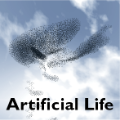Artificial life is a research field studying what processes and properties define life, based on a multidisciplinary approach spanning the physical, natural and computational sciences. Artificial life aims to foster a comprehensive study of life beyond "life as we know it" and towards "life as it could be", with theoretical, synthetic and empirical models of the fundamental properties of living systems. While still a relatively young field, artificial life has flourished as an environment for researchers with different backgrounds, welcoming ideas and contributions from a wide range of subjects. Hybrid Life is an attempt to bring attention to some of the most recent developments within the artificial life community, rooted in more traditional artificial life studies but looking at new challenges emerging from interactions with other fields. In particular, Hybrid Life focuses on three complementary themes: 1) theories of systems and agents, 2) hybrid augmentation, with augmented architectures combining living and artificial systems, and 3) hybrid interactions among artificial and biological systems. After discussing some of the major sources of inspiration for these themes, we will focus on an overview of the works that appeared in Hybrid Life special sessions, hosted by the annual Artificial Life Conference between 2018 and 2022.
翻译:人工生命是一个研究领域,研究什么过程和特性界定生命,其基础是贯穿物理、自然和计算科学的多学科方法。人工生命的目的是促进全面研究超越“我们所知的生活”和“可能的生活”的生活,并研究关于生活系统基本特性的理论、合成和经验模型。虽然人造生命仍是一个相对年轻的领域,但作为具有不同背景的研究人员的环境,人造生命已经蓬勃发展,欢迎来自广泛主题的各种想法和贡献。混合生命试图使人们关注人造生命界内一些最新的发展,这些发展植根于更传统的人工生命研究,但着眼于与其他领域互动所产生的新挑战。特别是,混合生命侧重于三个相辅相成的主题:(1)系统和物学理论,(2)混合增强,结合了生活和人工系统的结构,(3)人造和生物系统之间的混合互动。在讨论了这些主题的主要灵感来源之后,我们将着重概述由2018至2022年人造生命年度会议主办的混合生命特别会议上出现的作品。




